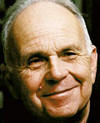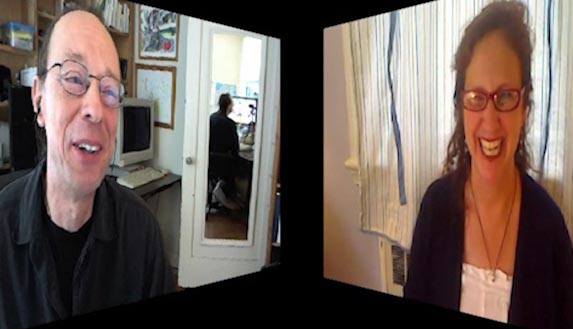But it is to say that the quality whose absence
Obama most lamented at the Supreme Court—empathy—has been
vanishingly rare in this election cycle as well.That’s why I can’t
read Obama’s words yesterday for their subtext, their super-text, or
their invisible risks and calculations. I read them as a very
literal reminder of what needs to happen more often during this
election campaign: We need to listen to the experiences of others
before dismissing them as dangerous, immoral, and wrong. Obama wrote
in The
Audacity of Hope, that his whole moral code was conditioned
on the idea that to be able to empathize with people richer and
poorer, more liberal and more conservative, is to be "forced beyond
our limited vision.” Andrew
Sullivan has called what
Obama did yesterday “letting go of fear.” You can’t do that unless
you listen to fear first, and that’s as good a descriptor as any for
what the president did this week.
|
|
|
Culture of Empathy
Builder: Dahlia Lithwick
Dahlia Lithwick & Edwin
Rutsch: How to Build a Culture of Empathy on the Supreme Court and Beyond There was a
great deal of contention and
confusion about the nature of empathy during the last Supreme Court
nomination hearings. We talked about preparing now, for the next Senate
discussions and debates about the role of empathy in the justice system
and Supreme Court.
"When Obama talked about
empathy in “The Audacity of Hope,” he was very, very clear. He
didn‘t want judges to make stuff up so that the poor guy wins. What he
said is, put yourself in the other person‘s shoes, right? That was his
mom‘s credo.
When he talks about
empathy, I think all he‘s saying is, just listen. Listen to what
the other side is saying. See if there is merit to their argument.
And then think it through." Sub
Conference: Justice
Dahlia Lithwick & Edwin Rutsch:
How to Build a Culture of Empathy on the Supreme Court
Transcripts
2012-05-10 - It’s About the Empathy, Stupid
2011-06-11 - Read Me a Story, and My Rights
2010-03-09 - The Unsung Empathy of Justice Stevens Justice John Paul Stevens is the model for why empathy matters. By Dahlia Lithwick and Sonja West But if the retirement of Justice Stevens highlights a single value we should demand in a justice, it's got nothing to do with race or gender or even professional background and everything to do with empathy for others.
It's been almost a year since President Obama made
his ill-fated remark that the quality he was seeking in a
replacement for former Justice David Souter was "empathy."
For anyone who may have repressed the subsequent unpleasantness,
here's a brief recap: The resulting media war on empathy, of course, completely twisted the word to mean that Obama wanted a justice who would use the Constitution as a decorative coaster and decide cases based on his or her feelings and the weather. Somewhere in the whole empathy brouhah
2010-04-08 -
Stevens’s Real Legacy: Why the E word matters.
2009-07-25 -The Next Justice
2009-06-15 - Umpire or Empathy - NYU Brennan Center for Justice - Video
A Brennan Center for Justice NYU's Furman
Hall debate on the proper qualities and role of a Supreme Court Justice.
"Umpire?" "Empathy?" (1/11) Youtube
Q & A - Questions:
2009-05-26 - MSNBC - Rachel Maddow - Dahlia Lithwick - going after her on the
empathy thing
MADDOW: Sensing an opportunity to rally their troops, conservatives wasted
no time pouncing on Sonia Sotomayor today. Activist judge, be afraid, oh,
no
empathy.
The always credible Karl Rove called her an unabashed liberal. So, is she
a liberal, abashed or otherwise? Dahlia Lithwick from Slate.com will join
us next with actual legal analysis of what counts as the left these days in D.C.
and in the judiciary.
But first, One More Thing about Sonia Sotomayor. There is one troubling
entry on her otherwise very impressive , especially for fans of the Boston
Red Sox, the New York Mets, or almost any other Major League Baseball team...
So, I think you‘re quite right. They are going after her on the empathy
thing and on the great life story thing. Funny, Clarence Thomas has a
great life story counted as a plus for him. But for Sotomayor, it somehow
suggests she‘s unhinged.
When he talks about
empathy, I think all he‘s saying is, just listen. Listen to what
the other side is saying. See if there is merit to their argument.
And then think it through.
That‘s not what Obama meant when he talked about
empathy, it certainly not something that‘s reflected anywhere in a
hundreds of cases if you look at her record, that this is a person who upends
the rule of law to give the little guy an extra leg up.
BOXER: And you.
MADDOW: Sensing an opportunity to rally their troops, conservatives wasted no
time pouncing on Sonia Sotomayor today. Activist judge, be afraid, oh, no
empathy.
The always credible Karl Rove called her an unabashed liberal. So, is she
a liberal, abashed or otherwise? Dahlia Lithwick from Slate.com will join
us next with actual legal analysis of what counts as the left these days in D.C.
and in the judiciary.
But first, One More Thing about Sonia Sotomayor. There is one troubling
entry on her otherwise very impressive , especially for fans of the Boston
Red Sox, the New York Mets, or almost any other Major League Baseball team.
2009-05-26 -
Stanley
Fish - Empathy and the Law This is
the answer to Dahlia Lithwick’s question, what’s wrong with empathy? It may be a
fine quality to have but, say the anti-empathists, it’s not law, and if it is
made law’s content, law will have lost its integrity and become an extension of
politics. Obama’s champions will reply, that’s what law always has been, and
with Obama’s election there is at least a chance that the politics law enacts
will favor the dispossessed rather than the powerful and the affluent. No, says
Walter Williams at myrtlebeachonline: “The status of a person appearing before
the court should have absolutely nothing to do with the rendering of decisions.” And so it
goes in an endless round of claims, counterclaims, accusations and dire
predictions. My own prediction is that we will hear it all again once Obama
announces his nominee and the drama of the confirmation hearings begins.
Must-see T.V.
2009-05-23 -The Bold Standard: Wanted: a visionary minimalist for the U.S. Supreme Court. The latest reports out of the White House have a senior administration official explaining on Thursday that when the president invokes empathy, he really means imagination—"a capacity to relate to real world experiences, a capacity to bring, when relevant, nonlegal perspectives into the court." The latest murmurings also suggest the president is looking for a persuasive writer and thinker who "can help tell a new story about justice and civil rights and the law to the American people." If it sounds slightly schizophrenic to be seeking a legal outsider who's also an insider, someone who can have "real life experiences" as well as a lofty constitutional vision, a person with "imagination" and rigor, that's because it is.
2009-05-20 -
Nothing More Than Feelings By Rodger Citron and Dahlia Lithwick It now seems almost a given that when the president talks about "empathy," what he really means is "woman." In fact, Obama seemed to mean several things when he stated that empathy would be a dominant factor in selecting his nominee to replace Justice David Souter. He hastily signaled his intention to nominate a woman, simply in that five of the six nominees on his shortlist are women. But he also has gone out of his way to explain that empathy means the ability to put oneself in someone else's shoes. Obama has stated that his ideal justice would consider the lives of the ordinary people who will be affected by the court's decisions in addition to the formal requirements and logic of the relevant laws. The feeling that the Roberts Court is in need of more empathetic justices has only ramped up since this week's decision in AT&T v. Hulteen, which upheld the rights of companies to give less retirement credit for pregnancy absences before 1979 than for medical leave generally.
2009-05-15 -
Crimes of Compassion: It's
not just liberals who play the empathy card
The GOP's misguided and confused campaign against
judicial empathy. One is surely entitled to say that President Obama's repeated claim that he seeks "empathy" in a replacement for Justice David Souter is something less than a crisp constitutional standard. But the Republican war on empathy has started to border on the deranged, and you can't help but wonder to what purpose.
Webster's defines empathy as
"the experiencing as one's own the feelings of another." Obama, in The
Audacity of Hope, described
empathy as "a call
to stand in somebody else's shoes and see through their eyes." To
Obama, empathy chiefly means applying a principle his mother
taught him: asking, "How would that make you feel? "before acting.
Empathy in a judge does not mean stopping midtrial to tenderly
clutch the defendant to your heart and weep. It doesn't mean
reflexively giving one class of people an advantage over another
because their lives are sad or difficult. When the president talks
about empathy, he talks not of legal outcomes but of an
intellectual and ethical process: the ability to think about the
law from more than one perspective.
|
||||||||||||
|
||||











